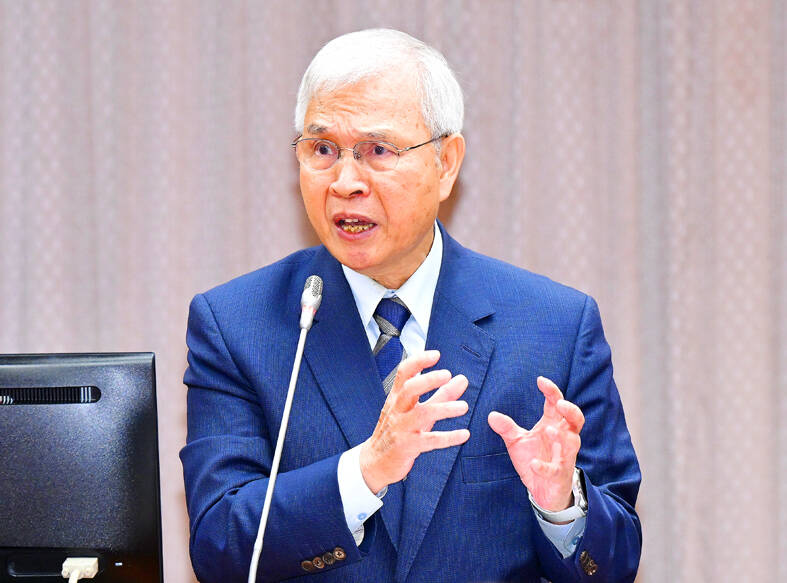The incoming administration of US president-elect Donald Trump is unlikely to impose stiff tariffs on Taiwan’s advanced chips as well as information and communications technology (ICT) products, because they are special and strategic materials the US needs, central bank Governor Yang Chin-long (楊金龍) said yesterday.
“Trump’s trade policies may affect Taiwan’s economy and financial markets through multiple channels... We need to be careful in dealing with monetary policy and foreign exchange,” Yang said at a meeting of the legislature’s Finance Committee in Taipei.
After Trump’s return to the White House in January next year, it might become normal for Taiwan to be on the US’ currency manipulation watch list given the nation’s rising trade surplus with the US in the wake of US-China trade disputes, Yang said.

Photo: Liao Chen-hui, Taipei Times
Taiwan benefited from order transfers during Trump’s first four-year term, the governor said.
As a result, Taiwan met two of the three criteria the US Department of the Treasury uses to judge currency manipulation, namely a trade surplus larger than US$15 billion and a current account surplus in excess of 3 percent of GDP, Yang said.
The governor attributed the trade imbalance to aggressive purchases of advanced chips and ICT products by US tech titans to develop artificial intelligence and new-generation consumer electronic gadgets.
That prompted Yang to doubt Trump would raise tariffs on Taiwan’s exports as they are special and strategic materials the US needs.
“The trend [of advanced chips designed by the US and made in Taiwan] is sustainable, as the US is seeking to stay ahead of China in technology competition,” Yang said.
The central bank and the US Department of the Treasury exchange views on the currency matter twice a year, he said.
The trade friction between the US and China looks to escalate if Trump makes good on his campaign pledge to raise trade barriers with the world and set off another round of global supply chain realignment, Yang said.
Higher tariffs and production base relocation would raise production costs and fuel inflation, especially for firms that rely on imported raw materials, he said.
Such expectations have been reshaping the interest rate trajectory and accounted for the 1.8 percent decline in the New Taiwan dollar against the US dollar following Trump’s electoral win last week, Yang said.
Trade barriers might slow GDP growth in China, Taiwan’s largest export destination, and local firms should pay close attention, he said.
Taiwan could move to reduce trade surpluses with the US through massive procurement of US agricultural, energy and national defense products, Yang said.
Investment in the US by local firms is another solution, the governor said, citing the example of Taiwan Semiconductor Manufacturing Co (台積電).

TAKING STOCK: A Taiwanese cookware firm in Vietnam urged customers to assess inventory or place orders early so shipments can reach the US while tariffs are paused Taiwanese businesses in Vietnam are exploring alternatives after the White House imposed a 46 percent import duty on Vietnamese goods, following US President Donald Trump’s announcement of “reciprocal” tariffs on the US’ trading partners. Lo Shih-liang (羅世良), chairman of Brico Industry Co (裕茂工業), a Taiwanese company that manufactures cast iron cookware and stove components in Vietnam, said that more than 40 percent of his business was tied to the US market, describing the constant US policy shifts as an emotional roller coaster. “I work during the day and stay up all night watching the news. I’ve been following US news until 3am

UNCERTAINTY: Innolux activated a stringent supply chain management mechanism, as it did during the COVID-19 pandemic, to ensure optimal inventory levels for customers Flat-panel display makers AUO Corp (友達) and Innolux Corp (群創) yesterday said that about 12 to 20 percent of their display business is at risk of potential US tariffs and that they would relocate production or shipment destinations to mitigate the levies’ effects. US tariffs would have a direct impact of US$200 million on AUO’s revenue, company chairman Paul Peng (彭雙浪) told reporters on the sidelines of the Touch Taiwan trade show in Taipei yesterday. That would make up about 12 percent of the company’s overall revenue. To cope with the tariff uncertainty, AUO plans to allocate its production to manufacturing facilities in

Six years ago, LVMH’s billionaire CEO Bernard Arnault and US President Donald Trump cut the blue ribbon on a factory in rural Texas that would make designer handbags for Louis Vuitton, one of the world’s best-known luxury brands. However, since the high-profile opening, the factory has faced a host of problems limiting production, 11 former Louis Vuitton employees said. The site has consistently ranked among the worst-performing for Louis Vuitton globally, “significantly” underperforming other facilities, said three former Louis Vuitton workers and a senior industry source, who cited internal rankings shared with staff. The plant’s problems — which have not

COLLABORATION: Given Taiwan’s key position in global supply chains, the US firm is discussing strategies with local partners and clients to deal with global uncertainties Advanced Micro Devices Inc (AMD) yesterday said it is meeting with local ecosystem partners, including Taiwan Semiconductor Manufacturing Co (TSMC, 台積電), to discuss strategies, including long-term manufacturing, to navigate uncertainties such as US tariffs, as Taiwan occupies an important position in global supply chains. AMD chief executive officer Lisa Su (蘇姿丰) told reporters that Taiwan is an important part of the chip designer’s ecosystem and she is discussing with partners and customers in Taiwan to forge strong collaborations on different areas during this critical period. AMD has just become the first artificial-intelligence (AI) server chip customer of TSMC to utilize its advanced